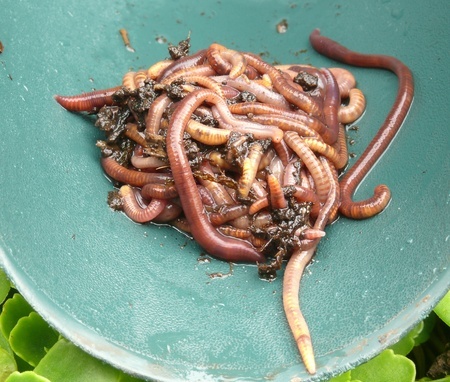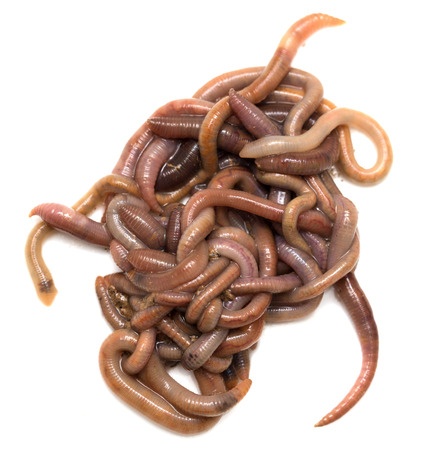Make An Organic Worm Farm – Your Garden’s Silent Servants
The most important job that worms undertake in the garden is to till and aerate the soil. They burrow really deep into the earth, creating channels in the soil that break up clods and allow the air to enter and water to penetrate and also drain away.
Worms eat at the surface and eliminate waste under the ground, in the process they introduce fresh organic material to the subsoil and thus increase the depth of the topsoil. By digesting decomposing organic material earthworms are making the soil more fertile by speeding up the process through which plants can access the nutrients that they need.
Organic gardeners know that the creation and maintenance of good soil structure is very important and that, unlike mechanical tilling equipment, worms do not damage the soil structure. Mechanical tillers can damage the soil by creating hardpans, breaking up the crumb structure or even inverting the subsoil to the surface. Worms cause none of these problems, in addition they never break down, create noise or pollution and they use our garbage as fuel! Earthworms are a great way to get rid of kitchen scraps!
Worm Farming DIY Style
Some people may already have equipment in or around their home that can serve as a worm farm but otherwise DIYers can get started by buying commercial worm farm units, these can be easily be purchased, they are easy to use and can look quite smart as well. It is normal to buy them with a starter supply of worms. Try to get hold of Tiger Worms or Red Worms for your initial stock.

Making Your Own Worm Farm
If you have, or can find a couple of old concrete laundry tubs or sinks then you have the makings of a great wormery or worm farm. Set them up in a shady place near to your propagating area, kitchen door or, with enough room, both places. Set the tubs up above the ground at a convenient height to access the drain holes in the bottom to collect your fertiliser. Remove the plugs and put a strainer into the hole to allow water to drain out without carrying away solid material.
The first tub should be filled up with compost, mixed with a handful of agricultural lime or dolomite and about a half bucket of garden soil. Place a bucket under the plug hole and water the compost mix with a fine water spray until it is saturated and water starts to drip into your bucket.
If you didn't already buy your starter population of worms, now is the time to do so. A tub of 500-1000 Red or Tiger worms will be ideal. You can buy these by mail order, or online, from professional worm breeders but also many garden centers will carry them too.
Next, add your starting stock of worms; then cover the surface with something like old hessian sacking, wet cardboard, old carpet. You are working to create an environment in which worms will do well; they like to be underground in cool, dark and moist surroundings.
Finally, for the installation phase you need to set up protection from flies and other insects. Don't use a close fitting or solid lid as this will suffocate the worms, instead fit a fly-mesh or shade-cloth screen lid.
For the first month there's nothing else to do except to ensure that the wormery remains moist, but not soaking wet. Once your worms are settled in you probably will not need to add more water. If the worm farm is exposed to rain, then make sure that water can flow out of the plug hole in the base of the tub or sink otherwise your worms could drown.
Feeding Your Worms
Your compost will feed the worms for quite some time but in order to maximise breeding you should use a supplementary feed every few days, particularly once the population starts to increase. Add a dessert spoon of lime or dolomite to each kilo of added food.
Rotate your worm feeding between the following:
- half a bucket of cow or horse manure mixed with water, well mixed and poured on the surface of the compost.
- a blender full of household scraps (but not onion peel, meat or citrus) blended into a sloppy consistency and poured on the surface of the wormery.
- rotten fruit, potatoes or pumpkins just placed on the surface of the farm.
- half a bucket of fresh compost, spread evenly over the surface.
Worms also like to eat the following:
- shredded, soaked cardboard and paper
- soaked and ripped pizza boxes
- egg shells, hair, leaves and dirt
Because worms have no teeth, in general, scraps should be chopped into small pieces, waste from a juicer is ideal, as long as there's no citrus in it.

Anything from the onion family (Onions, shallots, garlic, leeks) should be avoided. Worms will literally climb out of their home in order to avoid the small of the volatile oils in these items!
After a few months a healthy tub will be filled with a writhing mass of worms - that's the time to set up a colony in the second tub.
Colonising The Second Tub
Start the process by half filling the empty tub with the same mixture of compost, lime and soil that you used to make the first colony. As before, saturate the mixture with water.
In the first colony burrow down through the worms and compost to the plug hole and put in the plug. Set up your hose so that it is just dribbling into the first tub until it is about half filled with water. Replace the hessian over the tub to keep out the light. Whatever you do DON'T FORGET and leave the tub to completely fill or the worms will drown!
The worms will migrate from the sodden compost into the top of the first tub to avoid the water.
Scoop out the worms, keep some aside to put into your garden, and transfer the population into the second tub, their new home.
Place a bucket below the drain of the first tub and remove the plug and let the contents of tub one fall into the bucket. This liquid is a very rich liquid fertiliser and the tub will be half full with worm castings.
From now on you will repeat this process every month or so, transferring out about 30% of your worms into your garden (or maybe feeding them to your chickens?) each time. This will make sure that you have an everlasting supply of high quality liquid fertiliser as well as the rich worm castings to improve your soil.
Your organic plants will thrive as never before!

Anonymous: Love nurtured in heart for a distinctive individual of life gets glorified when that is expressed to that person in a soul-pleasing manner. Electing an enchanting flower bouquet or a riveting souvenir of your emotions for that special person can serve as a candied method to connect more closely with him/her. Send Flowers to India through the virtual shopping portals and transmit to the person you cherish scented fervors of dalliance. Send Cakes to India by the electronic shopping gateways and saturate the heart of the one you adore with delish glee.24.10.2016 0 points
Anonymous: Every individual has a soft corner regarding flowers and so, flowers occupy a prominent place in the hearts of the individuals. Flowers have various variants and are given with a special reason which soothes or heals the broken heart. The flowers have an aromatic essence which stimulates every occasion and so people Send Flowers to India.17.10.2016 0 points



